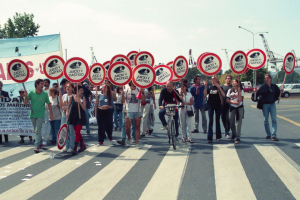
Presented at 5 PM - 6:30 PM EDT (GMT-4). This event will take place in Spanish with English interpretation over Zoom.
Joining us virtually from Buenos Aires for an upcoming webinar with Grupo de Arte Callejero, who will discuss their 23-yearlong practice of making art in the context of Argentine social movements in conversation with Solana Chehtman, a New York–based cultural producer, arts administrator, and philanthropy officer and consultant with experience in her country of origin, Argentina, and internationally.
This free and virtual event is part of Moore College of Art & Design's ongoing Conversations@Moore public program series, organized by the Graduate Studies programs in Socially Engaged Art. For more information, visit our website.
This edition of Conversations@Moore takes place in conjunction with the release of A Blade of Grass Magazine Issue 5, available free online on October 5. The magazine, themed “Confronting Enemies,” features an excerpt from the book Grupo de Arte Callejero: Thoughts, Practices, and Actions (Common Notions, October 2019), which was first published in Spanish in 2009 and is reprinted here with permission. This version was translated by Mareada Rosa Translation Collective. You are encouraged to get the book by visiting "Grupo de Arte Callejero: Thought, Practices, and Actions".
Image caption: Trial of Emilio Massera in the retirement courts of Comodoro Py in the Buenos Aires Province. This was the first march in which the road signs were used, which read “Justice and Punishment.” Photo by Grupo de Arte Callejero, March 19, 1998.

Event Actions
About the Speakers

Grupo de Arte Callejero is a Buenos Aires–based collective founded in 1997 that continues to work with human rights organizations, labor unions, nonpartisan political groups and research groups. From the beginning, their work has searched for a space for visual communication that escapes the traditional circuit of exhibition and exploitation, taking the appropriation of public spaces as its central axis of production. Many of their projects have emerged as collective constructions with political movements, groups and individuals, creating a unique dynamic of production that is in permanent transformation due to this constant exchange and putting into political practice.
Website
(Image caption: “Genociders Live Here” poster (2004). During the March 24 march, posters showed the addresses of identified genociders. The poster was updated annually from 2002 to 2006. Photo by Grupo de Arte Callejero.)

Solana Chehtman is a Latinx cultural producer and artistic programmer currently serving as Director of Civic Programs at The Shed. In this role, Chehtman curates and produces artist-nurturing programs, creative interventions and multidisciplinary dialogues, aiming at creating deeper meaning, strong sustainable relationships and, ultimately, advancing a more just and equitable society. Prior to joining The Shed, Chehtman was the Vice President of Public Engagement at the High Line. Other organizations she has collaborated with are Creative Time, New Museum's Ideas City, Queens Museum, Museum of Modern Art, Tribeca Film Institute and Fundacion Proa in Buenos Aires, Argentina. Chehtman is an adjunct professor at the Arts Administration Masters in Baruch College, City University of New York.


